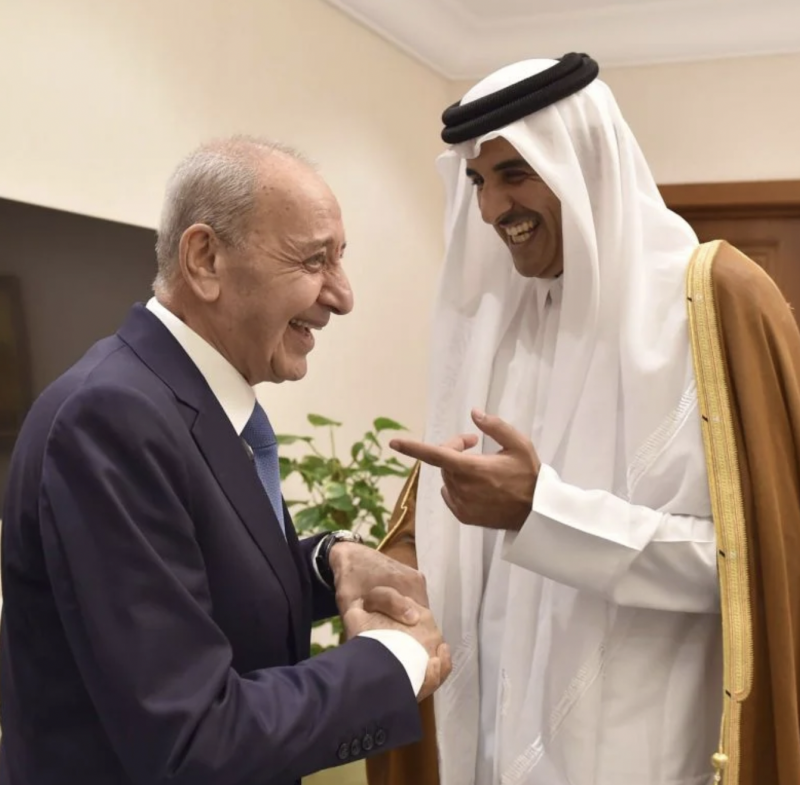
Parliament Speaker Nabih Berri received by the Emir of Qatar Tamim ben Hamad al-Thani in Doha, April 2019. (Credit: Parliament's Flickr account)
Qatar is a member of the Group of Five countries involved in the Lebanese issue, alongside France, the US, Saudi Arabia and Egypt. It has been making efforts towards an agreement on the presidential elections as well.
“These efforts do not impinge on the work of the Group of Five,” said a diplomatic source. “Each country has the right to act as it deems appropriate,” added the diplomat.
“Of course, any individual move may give the impression that there are differences within the quintet. But the result is the important thing,” the source assured.
In hopes of bringing about a breakthrough, the Group of Five’s ambassadors to Beirut are planning to meet with Parliament Speaker Nabih Berri again on Monday. They will discuss progress made in the contacts among the Lebanese themselves and with the rest of the world.
A meeting with Maronite Patriarch Bechara al-Rai is also scheduled for the same day.
The five diplomats are also considering whether to continue to tour parliamentary blocs and political forces, except for the presidential candidates.
The possibility that the five ambassadors make these visits together is also being debated, as the US diplomat is unable to meet the Free Patriotic Movement Leader Gebran Bassil, who is under US sanctions, or Hezbollah, which some countries consider a terrorist group.
A second Doha agreement?
Doha is not sitting idly by. This was the background to the visit MP Ali Hassan Khalil, Berri’s right-hand man, made to Doha. According to our information, Berri was invited twice to visit Qatar but preferred to delegate his political assistant.
During the visit, two main issues were raised: The situation on the southern front and the negotiation process to achieve a ceasefire in Gaza, a prerequisite for a calm in Lebanon.
Beirut is counting on Doha’s support for the restoration of calm, as well as the reconstruction and reinforcement of the Lebanese Army, which should deploy massively in south Lebanon after the war as per UN Security Council Resolution 1701.
The second issue discussed with Khalil is related to the developments in the presidential dossier and a formula that would be acceptable to the majority of political actors.
According to our information, Khalil will not be the only one to visit Doha. Gebran Bassil and Walid Joumblatt also received invitations from Qatar. Other leaders of political parties and blocs are also expected to be invited shortly.
These visits aim to examine all aspects of the Lebanese crisis and to work towards finding a formula for agreement to lay the foundations for a broader inter-Lebanese dialogue in Beirut under the Parliament’s umbrella.
The idea of holding a meeting for the Group of Five’s foreign ministers (or their envoys to Lebanon) in the Lebanese capital — which Qatar’s ambassador Sheikh Saoud bin Abdulrahman Al Thani put forward — is gaining ground, said the diplomatic source.
In parallel with these diplomatic efforts, the National Moderation parliamentary bloc, composed mainly of Sunni MPs previously affiliated with Hariri, is carrying on with its initiative.
Their proposal — consisting of holding consultations in Parliament, followed by an open-ended electoral session until a president is elected — is encountering difficulties.
Berri insists on leading the dialogue himself, which the opposition — notably Samir Geagea’s Lebanese Forces and Sami Gemayel’s Kataeb — categorically rejects, arguing that Berri cannot serve as both a rival and an arbitrator.
Another complication is that Hezbollah continues to openly insist on electing its candidate, Marada leader Sleiman Frangieh.
After the meeting that brought together MPs of the national moderation bloc and Hezbollah MPs, Hezbollah stated that it was not ready to discuss this possibility.
According to our information, Frangieh looks unfavorably on the bloc’s initiative, considering that it aims to eliminate his candidacy. This is one of the reasons why Hezbollah is not showing openness.
Georges Khoury rather than Joseph Aoun?
While Amal and Hezbollah continue to officially reject the idea of a third option, an Arab diplomatic source reported a more conciliatory tone behind the scenes.
“We received signs that Amal and Hezbollah are willing to discuss a consensus figure as a third option,” said the source. “This reality has imposed itself: No side can impose its candidate.”
“However, Amal and Hezbollah do not want to be faced with the choice of Army Chief Joseph Aoun as the third option,” the source added. On this point, they agree with Bassil who considers Aoun to be a political threat.
In this vein, there are reports that Berri and Bassil are attempting to coordinate and agree on a third candidate.
Bassil is also trying to persuade Hezbollah, as was Michel Aoun when a Hezbollah parliamentary delegation visited Rabieh last week.
As part of these convergence efforts, the name of the former ambassador to the Vatican and former army intelligence chief, Gen. Georges Khoury, is increasingly coming up. According to corroborating sources, caretaker Prime Minister Najib Mikati proposed Khoury’s name to the Qataris some time ago and said during a visit to Doha that Berri could endorse Khoury’s candidacy.
These leaks displeased Frangieh. He expressed his dismay to Mikati at a lunch in Beirut two weeks ago.
Despite all these efforts, this dossier will not be resolved soon. The presidential election is now linked to developments in south Lebanon. The contacts underway and the meetings to come will therefore only serve to prepare the ground until the conditions that would lead to a settlement ripen.
This article was originally published in L'Orient-Le Jour. Translated by Joelle El Khoury.